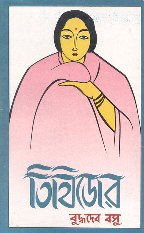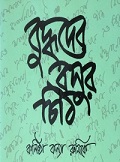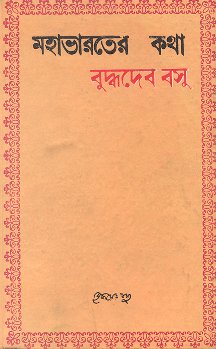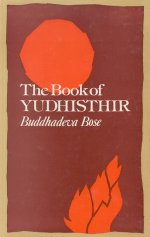Remembering Buddhadeva Bose, ‘The Compleat
Writer’
(This article is
essentially based on a lecture I gave at the invitation of the Sahitya Akademi,
It is a great
pleasure, and likewise an honour, to be asked by the Sahitya
Akademi to talk about Buddhadeva
Bose in
And I have also written on him in
Bengali several times, in various articles and in my new book, Tisidore, [2] which is just out, but when I sat down
to write this talk, I began to wonder how I could present the gist of such
discourses to a Delhi audience within a limited time, and where I should begin.
Then, in what seemed like an auspicious nanosecond, the name of a
seventeenth-century English classic, deeply buried within me for over half a
century, flashed upon my inward eye in my solitude. That book is The Compleat Angler, published in 1653, written by Izaac Walton, who lived from 1593 to 1683. It occurred to
me how well a phrase like ‘The Compleat Writer’,
modelled on The Compleat Angler, would describe
Buddhadeva Bose: ‘complete’ in the sense that all the
parts or elements that are needed to make a whole are there, nothing is missing,
with the additional suggestions of ‘consummate’ and ‘quintessential’.

Buddhadeva Bose (1908-1974) is the most versatile
literary figure in Bengali after Rabindranath Tagore, someone about whom it could be said that Tagore’s mantle had come to rest on his shoulders. As a
writer, he was a Renaissance man, excelling in every genre, and has left a
substantial output; everything hasn’t been gathered together in book-form yet.
An outstanding poet, he also wrote short stories; novels, ranging from the
major family saga Tithidore to novels
specializing in intense psychological analysis, such as Raat
Bhorey Brishti (Rain
Through the Night) and Golap Keno Kalo (Why the Rose is Black); brilliantly word-crafted plays
in both prose and verse; and eloquent non-fictional prose such as travelogues,
memoirs, and belles-lettres. He was a distinguished editor-publisher, a central
figure in the post-Tagore modernist movement in
Bengal who helped to change directions, a passionate literary polemicist, a
great letter-writer, someone who helped to launch the careers of several of his
contemporaries and of many younger writers, a creative literary translator who
inspired others, and although an intellectually inclined writer and a critic of
great acumen, a writer for children also. His entire life, from childhood to
his last day, was packed with literary activity bursting at the seams. He was
exemplary in his total dedication to his literary vocation, his detailed
understanding of what that vocation meant, and his enormous stamina in pursuing
it on a daily basis. He lived and breathed literature through good and bad
times.


And what times they
were, those times through which, for some of us, our parents’ generation lived
– the very heart of the twentieth century with all its turmoils,
two World Wars and the inter-war years, the Great Depression, the rise of
fascism, the decay of the British Empire, the different freedom struggles in
India, violent and non-violent, for Bengalis the famine of 1943, the Great
Calcutta Killing of 1946, the Partition, of course, with its aftermath, and the
subsequent effort to rebuild shattered lives.
Now that some of Bose’s letters to his younger daughter have been published
as a book, [3] we can see him reacting to and commenting on some major
political events in the subcontinent in the post-Independence period: from
cross-border conflicts and the rise of the Naxalites
to the liberation of Bangladesh. He read and travelled extensively, and
demonstrated through his life and works that one could be a cosmopolitan and a
writer committed to his mother tongue at the same time. Although a fluently
bilingual writer, he reserved his most sustained energies for enriching his
mother tongue, something which he regarded almost as a sacred task.

Rumi-ke
It was because of all
these thoughts crowding like shadows at the back of my mind that the book-title
The Compleat Angler, suddenly recalled, gave shape
to the phrase, ‘The Compleat Writer’. I began to
derive comfort and inspiration from those two phrases, as from a block of dark
chocolate. The mind is in some respects like a continuously expanding chest of
drawers, which gets crammed with all manner of items we love to hoard, some clearly
of value, others seemingly junky, but we cannot always tell which item will
suddenly prove its sterling merit one day. Some items disappear into a black
hole from which we can never retrieve them. Others linger in a ragged state,
and the expanding chest clings obstinately to them, refusing to let go, until one
day, in one of the obscure recesses, we spy a glint, lynx-eyes in a dark bush, and
we recognize something precious, something that could be put to use. Thus did
the name of a book, stored in my mind from my student days, come to my rescue when
I was fishing for a cue on how to begin my task of writing this talk. Fishing
is an apt metaphor in the context of the name of the book: The Compleat Angler.
As a gesture of
thanksgiving to this process, I want to read you two of Bose’s
sonnets on this very process of retrieval, which I translated in my Selected
Poems of Buddhadeva Bose. There is a third sonnet
too, which I didn’t translate; all three are very famous poems in the canon of
modern Bengali poetry.

Buddhadeva Bose
(Click here for recitation of ‘To Memory: 1’ and ‘To
Memory: 2’.)[4]
(Click here for the texts of ‘To Memory: 1’ and ‘To
Memory: 2’.)[4]
Buddhadeva was born on
In 1922 the family
moved to Dhaka, where Buddhadeva had his formal
education, first at school, then at the Intermediate level, and finally at the
university, where he read English Literature, and from which he duly took his
Bachelor’s and Master’s degrees with great distinction. ‘
In 1931, after
obtaining his M. A. degree, Buddhadeva migrated to
Calcutta in pursuit of a literary career.
His writing career had
several phases of development, and obviously I cannot deal with them in any
detail in a talk like this. All I can do here is pull out some important
threads from a rich story. In the context of Bengali writing, Buddhadeva belongs to the cluster of writers whom we group
together in the convenient category of post-Tagore
moderns. Such labels are rough-and-ready, and need to be understood as such.
Chronologically, Tagore’s long life meant that his
last phase coincided with the emergence of the new writers. Tagore
was continuously renewing himself, and every writer of grit is of course a
modern in his or her own time. Yet some demarcation is useful to separate
someone who grew up in the second half of the nineteenth century from those who
clearly belong to the twentieth. Tagore had shaped
the modern literary Bengali which the younger writers could not help using: it
was their natural heritage. It was his gift to them, and for this they were for
ever obliged to him. Yet they wanted to express new themes in it, reflect in
its mirror the new concerns of a less stable, more complicated, more fractured
and angst-ridden period of history. They never disowned him or lost their
respect for him. But he was a mountain-range, and they fretted being in the
rain-shadow area of such a mountain. They wanted to put their own marks on the
landscape. To those born almost half a century after him he was a
grandfather-figure, and at some stage grandchildren need to go their own way.
Bose, as a representative of the youngest generation of these aspiring writers,
played a crucial role in this process of differentiation. As he recalled in his
later years, his generation had to arrive at some kind of negotiation with Tagore: ‘a negotiation – that is to say, an arrangement, or
it might be called, from our point of view, an act of getting ready, so that we
did not remain for ever trapped in his vast net, so that he could become
bearable and usable for us.’ [5] Bose retained his affectionate relationship
with Tagore till the very end, visiting him in Santiniketan, and Tagore
recognized him as a new voice, but a degree of rebellion against the older
figure was inevitable, because the Zeitgeist was shifting. Professor Sibnarayan Ray, whose words I have quoted in my
Introduction to Bose’s poems, has summed up the
confrontation between the generations very aptly, so let me quote him again:
Against his [that is to say, Tagore’s] intuitive
apprehension of cosmic and personal harmony the accent now was increasingly on
the inevitability, even the desirability, of conflict and disorder; to his joy
of existence were opposed passionate feelings of frustration, anguish and
anger; his aesthetic gracefulness was challenged by underlining the social
reality of violence, exploitation and squalor; and the mystic-religious
dimension which related his love lyrics, especially of the middle period of his
career, to the tradition of the Vaishnavas, Bauls and Sufis, was rejected in favour of a more overtly
sex-oriented, secular and tormented eroticism. [6]
This is the core of
the modernist project in
You gave me desire, as dark as a moonless night:
from that I’ve moulded love, mixing it with the honey of my dreams.
........
I am a poet, and this is my pride –
I have created this music in exalted delight.
This is my pride – that your mistakes I have rectified
with my own dedicated enterprise. [8]
In 1930 Bose published
his first adult collection of poetry, which took its name from this very poem ‘Bandir Bandana’, thrown to God as a mocking challenge in
the guise of a song of praise. The collection marks a new, defiant beginning in
Bengali poetry.
In 1935 Bose founded the poetry magazine Kavita,
which he edited with loving care for a quarter-century. Kavita
became the leading Bengali poetry magazine of its time, where all important
poets aspired to be published. It was also an extremely important magazine for
the discussion and review of poetry. Bose was a superb stylist in critical
prose, and some of us learnt how to write book reviews and other forms of
literary criticism, using him as our model. He also set up a publishing unit
for his magazine, calling it Kavitabhavan, ‘The House
of Poetry’. He took on the role of an editor-publisher while fellow poets paid
for the printing of their collections. All activities were run from the poet’s
home. Between 1937 and 1966, he lived with his family in a first-floor
apartment at

In
This interest in
Comparative Literature, which he gained from his teaching experience and
travels in
translations of the poetry of Charles Baudelaire, Rainer
Maria Rilke, and Friedrich Hölderlin
into Bengali, which made these foreign poets our kinsmen, without destroying
their slight alterity. These spectacular achievements
made a deep impact on our generation and influenced the style and diction of
original poetry written in Bengali in the fifties and sixties. Indeed, the
activity of poetry translation had an influence on the evolution of Bose’s own poetic style in the mid-fifties. One can see it
clearly in his collection Je-Andhar Alor Adhik (The Darkness that
is Greater Than Light, 1958), which is regarded as a second thrust towards
modernism in his poetic career, after the initial thrust with Bandir Bandana, published in 1930. The two
sonnets I read out earlier are from this collection of 1958.

Baudelaire
Bose’s experience of teaching in various American
campuses also bore fruit in his own work. The need to teach courses in epic
poetry drew his attention afresh to the great Indian epics and led him to study
them in depth. This study led him to write some remarkable plays using and
re-interpreting old stories from that hoard, and his mature poetry also shows a
penchant for weaving both foreign and native Indian myths and legends into the
fabric of his work. He is equally at home with the Indian story of Rishyasringa and the Greek story of Icarus,
with the story of Arjun and the story of Elektra. The
renewed study of the Mahabharata
led also to the essays in interpretation published as Mahabharater
Katha. He was working on a planned second volume
of this book when he died. The first volume was translated by Sujit Mukherjee as The Book of
Yudhisthir. I must say that I find it difficult to
forgive the people who denied Bose a research fellowship at Simla,
when he was soldiering on with this work with very little money, his wife ill
and immobilized, and his own health deteriorating.


A fascinating aspect
of his personality is Bose the traveller. His travels within
(Click here for recitation of ‘Morning in Chilka’)[9]
(Click here for the text of ‘Morning in Chilka’)[9]
Likewise, he observed
and incorporated foreign landscapes in his poetry and prose, adding a fresh
dimension to the Bengali language. Travelling abroad matured him as a humanist
intellectual of his times, and he met and interacted with eminent contemporary writers
such as Henry Miller, Allen Ginsberg, George Oppen, and Stephen Spender.
His journey towards an
international outlook had indeed begun long ago, when he was growing up in
During Prabhucharan’s stay abroad my communication with him was
without a break. Ceaselessly I wrote to him, and ceaselessly got his letters.
When letters take three months or so to go back and forth, it is not really
possible to conduct a proper dialogue; it is only possible for each to describe
his present moments, a speaking out through letters in the literal sense.
Happily, both parties were extraordinary in their zeal and speed in the matter
of composing letters. We were both what is called effusive types of
personality, and we did not lack subjects in which we were both equally
interested. From Boston, from Los Angeles, from Santa Fé
– sometimes from the compartment of a Pullman train – then from London, Rome,
Paris, Berlin, Stockholm came letter after letter from him, and with them books
from different countries, and monthly and weekly magazines – piles of them –
such diversity! From the moment I got one of his letters in my hand, my
enjoyment of it began: rows of foreign stamps, paper as crisp as ironed cloth;
names of streets and hotels in so many unknown languages – and inside, so many
stories, so many items of new information, such affectionate greetings! Books
came: Ibsen, Maeterlinck, Gorky, Andreiev, Oscar
Wilde, Sean O’Casey, volumes of contemporary American poetry. Illustrated programmes of Moscow Art Theatre’s New York season found
their way to me. Enclosed with letters, newspaper cuttings came too – on the
dancing of Pavlova, the acting of Duse, performances
of Chopin’s music. Even those items that I didn’t entirely follow had something
to give me – an intoxicating scent on the bodies of the books, the polish of
printing, pictures, and the touch of breezes from far lands. The whole of the
Western world, spread from California to Russia, its art, literature, way of
life, its living geography, so many rivers, cities, and men and women not seen
with my eyes but waxing real in my mind – this it was that Prabhucharan
gave me as a gift, from my fourteenth to my sixteenth year, when I was emerging
from the ground like a sapling, wanting to lift my thin branches up to the sky
that arched over the whole world.
[10]
What began so
auspiciously matured in his later years into a deep wisdom which rejected
narrow, tribal-style nationalism in favour of international humanism – ideas in
a direct line of descent from Tagore, but backed up
by his own experience. This philosophy finds memorable expression in the
letters he wrote to his younger daughter Damayanti when
she was studying in the
This discussion will
not be complete unless I acknowledge my personal debt to Buddhadeva
Bose.
Buddhadeva believed that in order to write with
authenticity and to develop their potentials fully, creative writers really had
to engage with their mother tongues and write in them, not in a language that
was a colonial legacy. This belief earned him some hostility from the ‘Indo-Anglian’ lobby that was emerging in his time. It is curious
how he has been buffeted by different winds of cultural politics: the
anti-modernist Bengali Old Guard have ridiculed him and even brought the charge
of obscenity against him, the left have found him leaning too much to the West,
lacking in sufficient commitment to ‘the people’, while the ‘Indo-Anglians’ have disapproved of his view that writers should
write in their mother tongues, which are of course the languages close to ‘the
people’. Now that ‘Indian English writing’ has achieved wide acclaim, nationally
and internationally, both that event and Bose’s own commitment
to the mother tongue need to be looked at with new eyes. I have made some
comments in the section entitled ‘Translator’s Testament’ in my Selected
Poems of Buddhadeva Bose, and here are some
further thoughts.
The high noon of
‘Indian English writing’ is a complex phenomenon with many ambiguities embedded
in it. English has indeed penetrated
The literary scene in
Buddhadeva’s passionate commitment to the mother tongue has
a deep relevance not only in the multilingual subcontinent, but also in the
world at large. I see it as his loyalty to the long-term interests of his
native language. Languages are the cultural equivalents of the rain-forests,
storehouses preserving intellectual diversity. We have to see to it that this living
diversity does not shrink. How do we do it? The point is that unless we actually
write in a language, we cannot augment and enrich its treasury of concepts. It
is only when we write in a language in an active, sustained, and committed
manner over a long period that we can seed it with new ideas and see those
ideas grow, flourish, and bear fruit. ‘Now more than ever seems it’ [12]
needful for us to grasp this, now that ‘Indian English’ has been conceptualized as an Indian language and is being
consciously developed as the lingua franca of the pan-Indian urban elite.
Powerful forces of cultural entrepreneurship and patronage, as well as
commercial interests within the educational establishments, the media, the
academia, and the publishing industry are at work in this project.
Inevitably, there is a
fall-out from this process for those who wish to write seriously in the native
Indian languages and nourish and vitalize them. We are under pressure. As
contemporary writers in the Indian languages, we do not enter the ongoing
literary discourse at the pan-Indian level, but are kept at the ‘regional’
level by the over-arching, hegemonic presence of English. Abroad, it sometimes
seems that scholars have almost forgotten that Indian writers may write in
languages other than English. I sometimes wonder what Bose would have made of
this situation. For those of us writing in our original languages while in diaspora, our work necessarily entails additional struggles
at many levels that are not discussed or even understood by others. It is in
sustaining these critical struggles that Buddhadeva’s
inspiration has been extremely important in my life, operating at a very deep
level. Though I was not able to interact with him directly as an adult, he has
always been there, a profound influence at the very centre of my literary life
and a presence in the subterranean layers of the psyche.
A writer of Bose’s stature deserves to be translated into the major
modern languages of
Ladies and gentlemen! Greetings from
Poems are like migratory birds – they fly across seas and borders,
following no tracks, just a mysterious instinct.
I am so glad that some exotic poems have found their way from the Tropic
of Cancer to the
I am happy to announce that the first of my translations, the
magnificent poem ‘
The poems of Buddhadeva Bose are full of
strange enchantment and they touch my heart in a special way. I send my
greetings to your festival, where you are celebrating him! I cannot send
flowers through the air, but I send my love with the first stanza of the
Finnish ‘
Kerran kauan sitten Kalkutta oli silmissäni
vailla vertaa, ihmeellisen kaunis,
kuin unen alku, tai outo kukka jonka
mielikuvitus on luonut.
Sen pölyssä, sen tuulessa, kuumassa metalisessa hengityksessä
intohimoni
huusivat äänen.
Thank you!
Hannele Pohjanmies [13]
I should
mention that since she sent this message, her translation has indeed been
published. To bring this distant reader of Bose into the loop, I would like to
read you my translation of this poem, ‘
[1] The Selected Poems
of Buddhadeva Bose, Translated and Introduced by Ketaki Kushari Dyson, Oxford
University Press, New Delhi, 2003. Henceforth referred to as SPBB.
[2] Ketaki Kushari Dyson, Tisidore, Ananda
Publishers Private Ltd.,
[3] Buddhadeb Basur Chithi: Kanishtha Kanya Rumike, ed. by Damayanti Basu Singh, Vikalp,
[4]SPBB, pp.
72-73.
[5] See SPBB,
p. xv and p. lxi. The fragment is translated from Bose’s autobiographical Amar
Jauban, M. C. Sarkar
& Sons,
[6] See SPBB,
p. xv and p. lxi. The fragment is quoted from Ray’s
Introduction to Ray and Maddern (editors), I have
seen
[7] See, for instance,
Jeet Thayil or Bruce King,
in Fulcrum, an annual of poetry and aesthetics, published from
[8] SPBB, p. 3.
[9] SPBB, pp.
17-18.
[10] SPBB, pp. xxv-xxvi.
[11] See note [3]
above.
[12] I am echoing
Keats’s line ‘Now more than ever seems it rich to die’, from his ‘Ode to a
Nightingale’.
[13] Thanks to an
audiotape sent by Hannele, I was able to train myself
to read out the Finnish fragment in both
[14] The
poem ‘
Published May, 2009
Send us your feedback
©Parabaas, 2009

